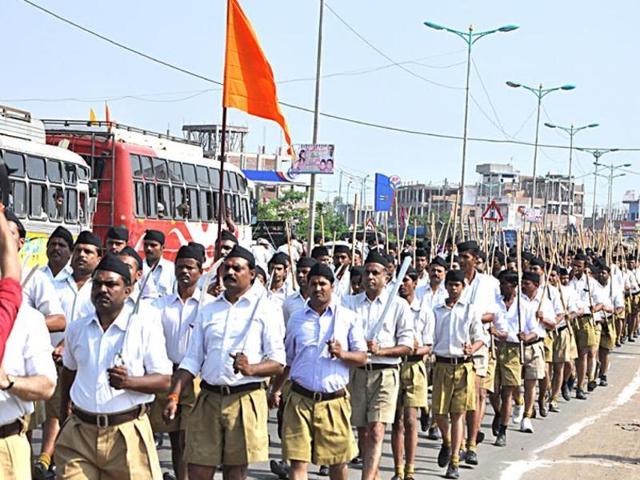RSS asks govt to check ‘anti-national’ activities in universities
The Sangh’s pointed statement about anti-national activities was in reference to the University of Hyderabad, where the RSS has been accused of fanning anti-Dalit sentiments, and the Jawaharlal Nehru University in Delhi, where anti-India slogans were raised, resulting in nationwide uproar.
The Rashtriya Swayamsewak Sangh (RSS) asked the government on Friday to crack down on “subversive” elements indulging in “anti-national” activities in universities.

“We expect the Central and state governments to deal strictly with such anti-national and anti-social forces and ensure the sanctity and cultural atmosphere by not allowing our educational institutions to become centres of political activities,” the Sangh said while presenting its annual report in Nagaur.
The three-day Pratinidhi Sabha, a meeting of the saffron group’s highest decision-making body, assumes significance as the Narendra Modi government draws flak over its mishandling of the JNU row, the death of a Dalit student at the University of Hyderabad, allegations of saffronisation of education and growing intolerance in the country ahead of crucial assembly polls in five states.
The Sangh’s pointed statement about anti-national activities was in reference to the University of Hyderabad, which it calls Bhagyanagar University and where the RSS has been accused of fanning anti-Dalit sentiments, and the Jawaharlal Nehru University in Delhi, where anti-India slogans were raised, resulting in nationwide uproar.
“When renowned and premier universities, which are expected to groom patriotic citizens by imparting them the lessons of unity and integrity generate people who raise the slogan calling for breaking of and destroying the nation, this naturally becomes a matter of concern for the patriotic people,” the Sangh said in its annual report at the meeting.
It dubbed the event organised to mark the death anniversary of Parliament attack convict Afzal Guru as “incidents that pollute the social environment”.
The Sangh also flagged the violence during Gujarat and Haryana quota agitations, the burning down of a police station in West Bengal’s Malda, and the Pathankot terror attack as challenges to the administrative machinery, which weaken social harmony and trust.
In addition, the RSS contradicted allegations of it perpetuating misogyny by describing the practice of barring women from temples as “unfair traditions”, in sharp contrast to an editorial in the RSS mouthpiece, Organiser, that defended the practice as “a matter of faith” for the temple trusts.
On Friday, the Sangh referred to old texts and traditions to emphasise that “men and women are naturally considered to be equal partners” and permitted entry into the temples “without any discrimination”.





